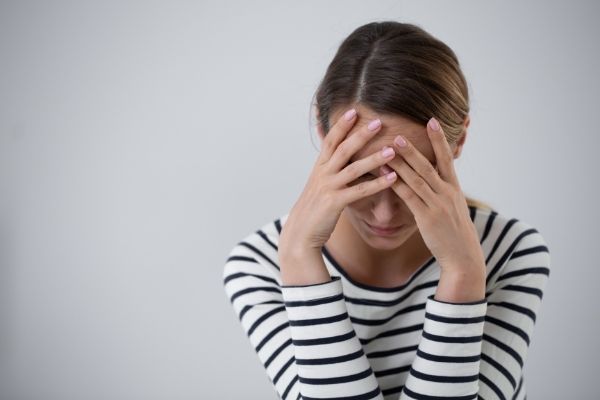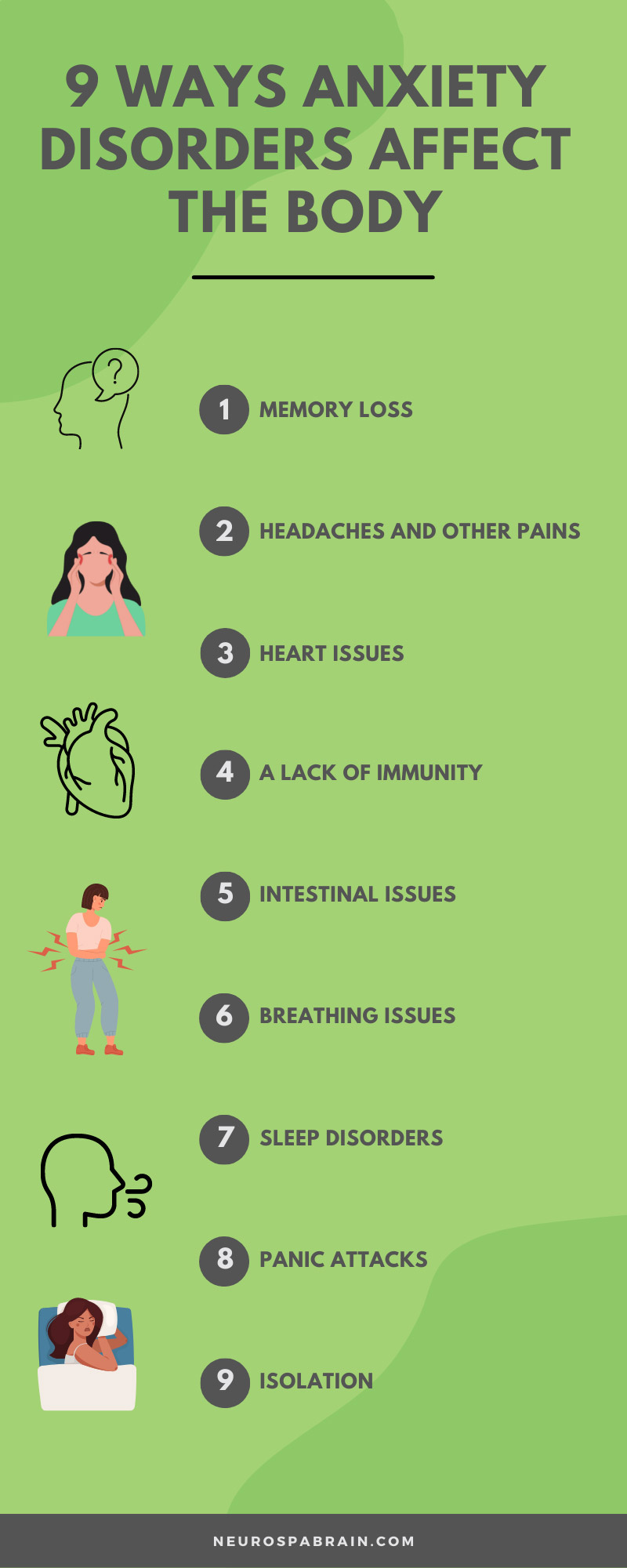
Everyone experiences anxiety at some point, but for some people, anxiety is a disorder that can interfere with their quality of life. Anxiety disorders can include phobias, PTSD, OCD, and general anxiety disorder (GAD). These conditions can cause a person to experience fear, depression, panic, and other feelings of doom or helplessness.
But while anxiety mostly affects a person’s mental well-being, an anxiety disorder that persists can eventually have a negative effect on a person’s physical health through repetitive stress. Here are nine ways anxiety disorders affect the body. If you think you’re experiencing an anxiety disorder, speak with your doctor or other healthcare provider about it. Otherwise, here’s a little more info about them and how they can affect you.
Memory Loss
Everybody forgets things occasionally, but anxiety disorders can cause persistent memory loss. Stress and anxiety can lead to greater electrical activity in the brain and increased levels of adrenaline and cortisol, which can lead to poor recall. This affects the brain, which can lead to not just forgetfulness but also an inability to deal with appointments and poor job performance, which can lead to even greater anxiety—and the cycle continues.
Headaches and Other Pains
Anxiety tells your brain that something is wrong. In response, your brain releases chemicals, signaling to your body that it needs to prepare for fight or flight. This leads to contracted muscles, which, when allowed to continue, can cause chronic pain and exacerbate previously existing conditions.
Heart Issues
Everyone can use a good cardiovascular workout. Exercise causes the heart to pump faster and the lungs to breathe more deeply, making them stronger and healthier, and ensuring delivery of oxygen-rich blood to your body’s organs. Anxiety has the same effect of increasing your heart and breathing rate, but not in a positive way. As mentioned above, when under threat, the brain puts out word to the body to be ready to run or defend itself. Anxiety can cause the heart to beat faster and the lungs to breathe more quickly. Rather than exercising the circulatory system, this just puts a greater strain on it. This can in turn lead to high blood pressure, incurring the development of heart disease, which can lead to a heart attack or heart failure.
A Lack of Immunity
Once again, anxiety can weaken the body’s best features, especially its immune system. Constantly high stress levels means the body is inundated with hormones and kept on high alert without respite. When your body can’t rest it can’t recuperate, which leads to a puny immune system, making you more susceptible to bacteria, viruses, and other sickness-causing factors. Getting sick leads to more anxiety, which batters your immune system even more, leading to other health problems, which we’ll cover next.
Intestinal Issues
We’ve all experienced cramps, bloating, and other unpleasantness before a big event or during emotional periods in our lives. But anxiety can create intestinal issues accompanying a stressful event, and for far longer. This happens because of all those hormones stress and anxiety release. Many interfere with your digestion, speeding it up or slowing it down. Stress can increase the amount of acid in your stomach and affect the bacteria and flora living in your digestive tract. These induce intestinal issues like diarrhea, constipation, bloating, stomach pain, gas, and more. All of these symptoms aren’t just embarrassing but also bad for your appetite and health.
Breathing Issues
When we get scared, we breathe more rapidly, potentially to get more oxygen to the body. The problem with anxiety disorders is that we’re scared more often, and when we don’t usually need to be. This can lead to weird and irregular breathing patterns where the person is getting less oxygen while not getting rid of carbon dioxide. This can cause dizziness and even make the extremities go numb. If you already have breathing problems, anxiety can worsen them.
Sleep Disorders
Sleep is so important to a healthy lifestyle. If you fail to get your seven or eight hours of sleep every day, the body can start to break down I many of the ways listed above. Having an anxiety disorder only compounds a lack of sleep. Anxiety can cause insomnia, keeping a subject awake and worrying for hours. Likewise, anxiety can encourage the occurrence of bad dreams and night terrors, leading to less restful sleep as well. When you lack sleep, your body reacts with feelings of irritability, aggression, depression, and more.
Panic Attacks
Panic attacks can be a problem on their own, but they often accompany the anxiety disorders above, namely PTSD, OCD, and GAD. Panic attacks are unexpected and inexplicable periods where the sufferer may experience feelings of impending doom, breathing issues, chest pain, numbness or tingling, dizziness, chilliness, and other symptoms with no readily apparent cause. Panic attacks aren’t immediately harmful to the body, but they are a big sign that all is not well for the afflicted person.
Isolation
Humans are social creatures, but the need to occasionally be alone is also important. However, too much is never a good thing. A profound anxiety disorder can cause a person to withdraw from life and other people. They may avoid social engagements and activities they once enjoyed. They begin to keep to themselves, not letting others know about the issues they’re facing nor seeking treatment. This can produce depression, lethargy, and other mental issues—and even suicidal ideation. People need mental stimulation and conversation with others, and withdrawing from society removes the opportunity to do so. Again, it’s another situation where things can from bad to worse, and to even worse in no time.
Treatments and More
Now that we’ve covered the nine ways anxiety disorders affect the body, and now it’s time for some of the ways to treat and potentially even cure an individual. Naturally, seeing your doctor is always a great first step. Describe your symptoms and concerns, and they’ll determine a course of therapy or medication that can help you. Different medications are available to take the edge off, while others can address specific symptoms.
Therapy is usually a good thing to do, because sometimes simply talking about problems can make them seem less significant. More experimental treatments are available, such as brain stimulation therapy for anxiety. Every person is different, however, so be forthcoming with your physician, and together, you can find the right course for you!


